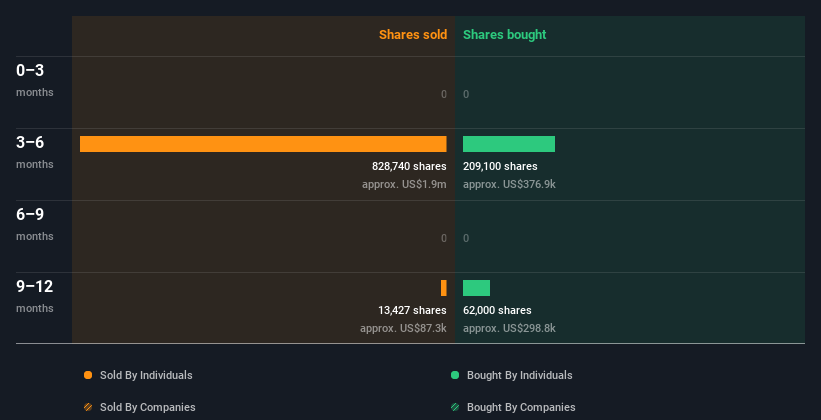- United States
- /
- Electrical
- /
- NYSE:STEM
Selling Stem Shares at a Lower Price Than Current Market Value May Have Been a Costly Mistake for Insiders

Stem, Inc.'s (NYSE:STEM) stock price has dropped 52% in the previous week, but insiders who sold US$1.8m in stock over the past year have had less luck. Insiders might have been better off holding onto their shares, given that the average selling price of US$2.14 is still below the current share price.
Although we don't think shareholders should simply follow insider transactions, logic dictates you should pay some attention to whether insiders are buying or selling shares.
Check out our latest analysis for Stem
Stem Insider Transactions Over The Last Year
The CEO & Director, John Carrington, made the biggest insider sale in the last 12 months. That single transaction was for US$359k worth of shares at a price of US$1.85 each. While insider selling is a negative, to us, it is more negative if the shares are sold at a lower price. The silver lining is that this sell-down took place above the latest price (US$0.59). So it may not tell us anything about how insiders feel about the current share price.
Over the last year, we can see that insiders have bought 271.10k shares worth US$677k. But insiders sold 842.17k shares worth US$1.8m. All up, insiders sold more shares in Stem than they bought, over the last year. They sold for an average price of about US$2.14. It is certainly not great to see that insiders have sold shares in the company. But the selling was at much higher prices than the current share price (US$0.59), so it probably doesn't tell us a lot about the value on offer today. You can see the insider transactions (by companies and individuals) over the last year depicted in the chart below. If you want to know exactly who sold, for how much, and when, simply click on the graph below!

For those who like to find hidden gems this free list of small cap companies with recent insider purchasing, could be just the ticket.
Insider Ownership Of Stem
Another way to test the alignment between the leaders of a company and other shareholders is to look at how many shares they own. I reckon it's a good sign if insiders own a significant number of shares in the company. Insiders own 4.2% of Stem shares, worth about US$6.8m, according to our data. We do generally prefer see higher levels of insider ownership.
So What Does This Data Suggest About Stem Insiders?
It doesn't really mean much that no insider has traded Stem shares in the last quarter. The insider transactions at Stem are not inspiring us to buy. And usually insiders own more stock in the company, according to our data. So while it's helpful to know what insiders are doing in terms of buying or selling, it's also helpful to know the risks that a particular company is facing. When we did our research, we found 4 warning signs for Stem (2 shouldn't be ignored!) that we believe deserve your full attention.
If you would prefer to check out another company -- one with potentially superior financials -- then do not miss this free list of interesting companies, that have HIGH return on equity and low debt.
For the purposes of this article, insiders are those individuals who report their transactions to the relevant regulatory body. We currently account for open market transactions and private dispositions of direct interests only, but not derivative transactions or indirect interests.
New: Manage All Your Stock Portfolios in One Place
We've created the ultimate portfolio companion for stock investors, and it's free.
• Connect an unlimited number of Portfolios and see your total in one currency
• Be alerted to new Warning Signs or Risks via email or mobile
• Track the Fair Value of your stocks
Have feedback on this article? Concerned about the content? Get in touch with us directly. Alternatively, email editorial-team (at) simplywallst.com.
This article by Simply Wall St is general in nature. We provide commentary based on historical data and analyst forecasts only using an unbiased methodology and our articles are not intended to be financial advice. It does not constitute a recommendation to buy or sell any stock, and does not take account of your objectives, or your financial situation. We aim to bring you long-term focused analysis driven by fundamental data. Note that our analysis may not factor in the latest price-sensitive company announcements or qualitative material. Simply Wall St has no position in any stocks mentioned.
About NYSE:STEM
Stem
Operates as a digitally connected, intelligent, and renewable energy storage network provider worldwide.
Slight and fair value.

